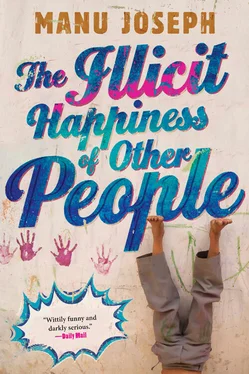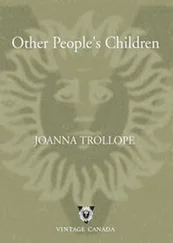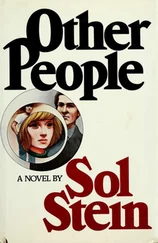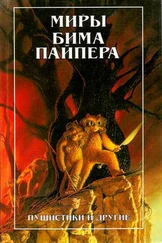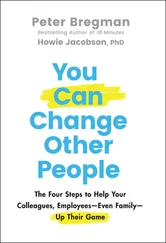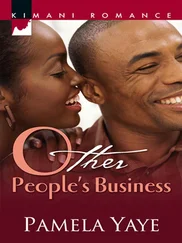A short, stout man in a white cassock walked to the coffin and stood with his hands joined at his crotch. After a few moments he said, ‘You must be Ousep Chacko.’
‘Yes.’
‘I’ve never seen you before.’
‘I never come here,’ Ousep said.
‘Eventually, they all come. Isn’t that true, Ousep? The high and the low, they all come. Your wife is a good woman. She is a pious woman.’
‘She is.’
‘She is like a child.’
‘That’s true.’
‘I want to tell you something, Ousep,’ the man said softly, taking Ousep a few feet away from the coffin. ‘We are in the temple of truth but we are also men of the world, we are practical men. I am hearing things about how the boy died, you know people talk. I don’t want to know how he died. It does not matter. As long as he is truly dead I will bury him. But what we say is that it was an accident. We will say that today and we will say it every day.’
‘As you wish.’
‘The boy, he was a good boy deep inside. But he was not normal.’
Ousep looked carefully at the priest. A fifty-year-old virgin, a fully grown man in a white gown who believed that he was an elf who connected God to man, this clown thought Unni was strange.
‘Ousep,’ the priest said, ‘some boys wander far. There is nothing we can do about it. They wander too far.’
There was a flicker of triumph in his narrow eyes. It was a triumph Ousep would see often, in the days to come, in the eyes of other men.
The priest left and in a few minutes appeared at the altar. He told the empty church, ‘We are here today to remember Unni Chacko, son of Ousep Chacko and Mariamma Chacko. A child of only seventeen. Such a pure child that God has taken him to heaven. Unni was a very talented and bright boy. He was a good person, and everybody loved him.’
That was it. The story of Unni Chacko’s life as told by an imbecile to an empty hall.
The priest wiped his mouth and said his prayers with slow tired movements, throwing glances at the walls and the floor and the empty pews. For a moment his eyes rested on Mariamma; they stayed longer than he had intended and his face slowly changed from blank to disturbed, and he began to pray in a distracted way.
Ousep looked at his wife. Her lips were curled into her mouth, her head tilted, her eyes glaring at the giant crucifix on the altar, and she wagged a finger.
MARIAMMA CHACKO BITES HER lip with a ferocity that makes her head tremble and her eyes look interested. She stands facing the bare yellow wall and she wags her index finger. She tells the wall, in a quivering voice, about Ousep’s mother and his nine sisters, all unforgettable cows whom only the soil and weather of Kerala can produce. She gets into this state sometimes and when she is this way she loses her sense of the world around her. But there is something about the hum in the air, and the way it stirs the peace of noon. It is now clearly the murmur of men and it does not have the joy of a road accident. The voices are faint and meek as if the men are trying to achieve silence, which is impossible in Madras if more than one person has gathered at a place. As the hum grows, Mariamma’s rebuke of the wall becomes softer, she begins to whisper. Finally, she gives a snide nod, relaxes her muscles and is even mildly embarrassed by what she has been doing. She licks her lips and listens carefully.
The murmur reminds her of Unni. The truth is that everything reminds her of Unni and she only invents the special connections. But the murmur does have a haunting presence in her memories because the worst day of her life had begun this way — with the whispers of men that she had first thought had nothing to do with her life. That Saturday, after the prayer meeting, she walked home with a branch of stolen bougainvillea in her hand. When she went down Balaji Lane people looked at her from their balconies and windows, and she thought it strange because people did not look at her any more. When she was at the gates of Block A, she saw a crowd that looked her in the eye. A deep human silence spread, and she could not feel her legs any more. A woman took her by hand and said that they must walk to Ajanta Hospital.
The moment Unni’s head hit the ground, what was she doing? She has thought about this many times. She hopes it was not the moment when she was trying not to laugh as the prayer group raised its cries to the heavens, or when she approached one of the ladies for a loan, or when she tried to smile in shame as her request was being politely declined. She hopes he had not fallen when she was in the prayer group because she is not proud of what she does there. She is the spy of the parish priest, the mole who brings him news about the Catholic sheep that are increasingly flocking to Pentecostal evangelists. That is what Mariamma does in her spare time, and she does it because the priest waives the school fees, instructs the Sacred Heart Family Store to give her anything she wants on credit as long as she clears the dues every two months.
She hopes she was doing something dignified when the last sigh of breath left the lungs of her child; she hopes she was walking back home like a good mother, thinking about what meal to cook for two boys who ate so much.
When Unni was a little boy he was deeply interested in getting married. He was just five then and he was willing to wait till he reached the legal age but not a day more. He was so desperate to be married that she often used it to get her way. ‘Unni, if you don’t brush your teeth I won’t get you married.’ That was enough to send him running to the bathroom. How did that boy grow so strong?
He spoke a lot about death but not in a dark way as people now claim. One morning he stood in the doorway of the kitchen, bare-chested as he always was when he was at home. He had red spots all over his firm athletic chest because he was the type mosquitoes would bite. He told her that he had had a very funny thought. As he spoke he ran his thumbs over her forehead, a habit he had picked up when he was around seven, believing that the lines on her forehead were worries and that he could make them vanish by straightening the creases. ‘People want to be happy, don’t they?’ he said. ‘They are desperate to be happy, aren’t they? But look at how many things have to go right in a person’s life for that. Your spouse has to be all right. Your children should not die before your time. And your grandchildren should not have polio or something. They, too, should not die young, of course. And their children, and their children, even if they come after you are long gone, they have to be all right. Everyone has to turn out fine. So many lives have to turn out right. What have you started, Mariamma Chacko, do you realize what you have started by having children? A whole line of humanity that would not have appeared without you. Surely, things would go wrong somewhere?’
And he said something strange. ‘But still, if I die, imagine I die,’ he said, ‘you would be sad, I know. Of course, you will be sad. But not as deeply as people would presume. In this world, it is very hard to escape happiness. That’s how it is.’
The boy thought too much, he was full of ideas. And he told her everything. He was not like the other boys, he did not treat his mother as an idiot who made food. He loved talking to her.
Sometimes he would say, ‘Come, let’s find the meaning of life.’ And he would hold his chin and look at the floor, pretending to be in deep thought. After a few seconds he would shake his head and say, ‘No, couldn’t find it.’ And they would laugh, always laugh.
Other days he was more serious about these matters. He told her that there were people who walked among them who knew something, something very important, but they could not explain. He really wanted to believe that. If he heard of a person who behaved in an extraordinary way, he would become very curious, he would try to find out more, even loiter near their homes. That’s why some people thought Unni was a bit odd himself.
Читать дальше
